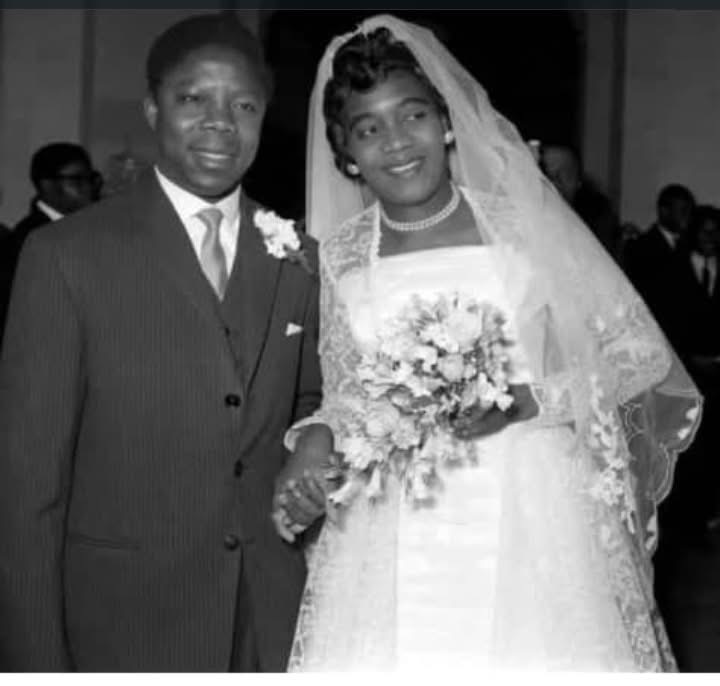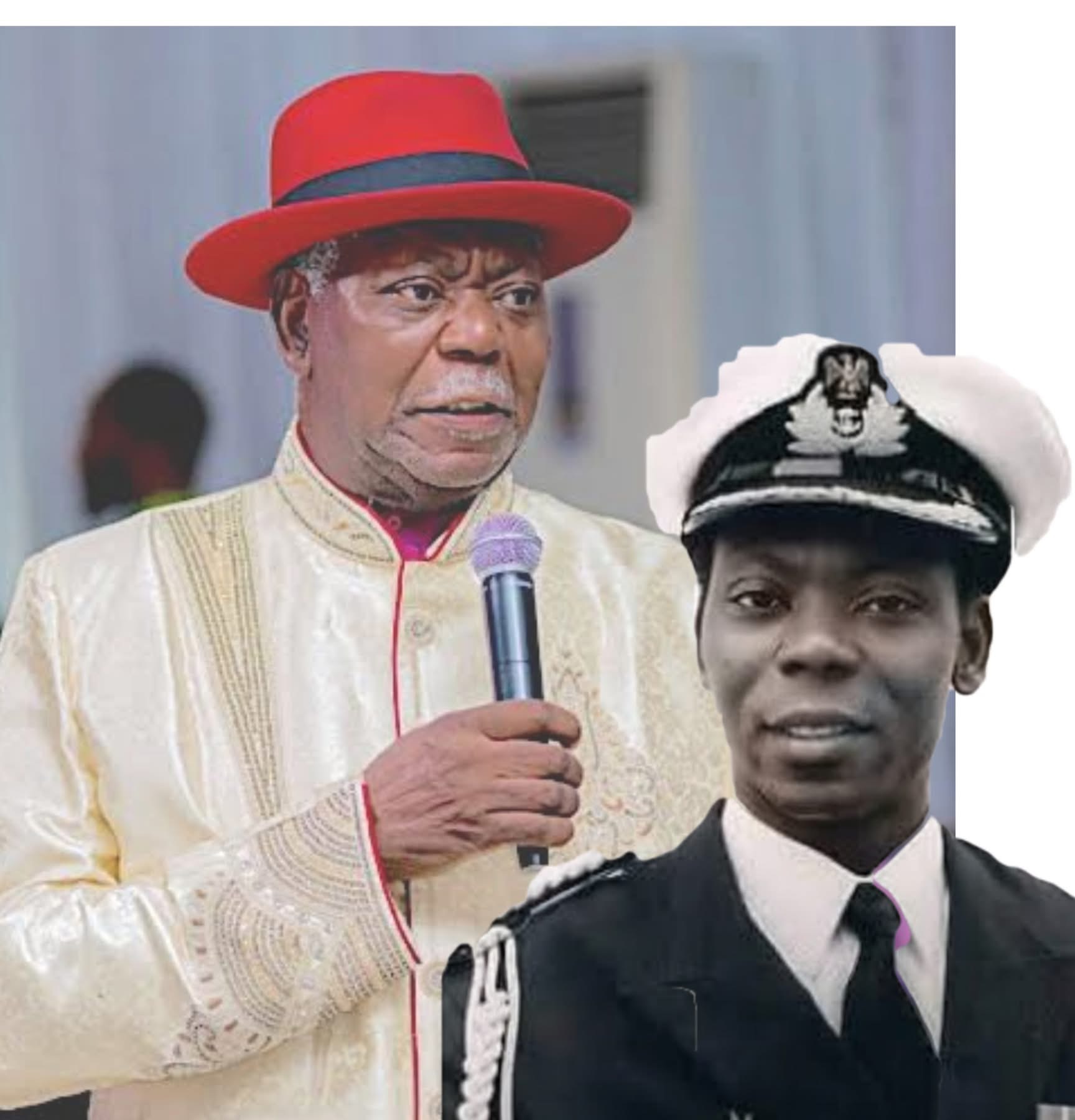Columns
ICYMI: ACCOLADES AS IMO APC BOSS EBERE IMMORTALIZES PARENTS, BUILDS ADORATION CHAPEL AT St PAUL’S CATHOLIC PARISH, OWERRI
By Emma Madumere
Yesterday at the popular St. Paul’s Catholic Church, Owerri, was a day of praises and encomiums for late Engr Vincent Chukwuemeka Ebere and his late wife, Nneoma Stella Ebere, for the wonderful children they gave to mankind. The colorful event was animated by the litany of praises for the departed based on their antecedent, using their children as a contact point, especially the incumbent Chairman of the ruling All Progressives Congress (APC) in the state.

Adoration Chapel at St Paul’s Catholic Church Owerri
As a way to immortalize their beloved departed parents, their children built a multi-million-naira Perpetual Adoration Chapel for St. Paul’s Catholic Church in honor of their late parents.
The official commissioning of the edifice, which attracted the Catholic Archbishop of Owerri Ecclesiastical Province, His Grace Archbishop Lucius Ugorji, and other sea of Catholic priests, also witnessed the presence of the Deputy Governor of Imo State, Prof Placid Njoku, who represented the Special Guest of Honour and Governor of Imo State, Senator Hope Uzodimma.

Hon. Macdonald Ebere PHD.
Preaching a sermon at the thanksgiving mass, Archbishop Lucius Ugorji, who described the APC Chairman of Imo State, Hon Macdonald Ebere, PhD, and his siblings as well-trained Catholic faithful, also stressed that their decision to immortalize their beloved departed parents has gone a long way to clearly demonstrate that they actually imbibed the training given them by their parents.
He said that the Chapel will provide an alternative center for Catholic faithful within Owerri Municipal to have a one-on-one interaction with God.

Macdonald Ebere with the Deputy Governor of Imo State Prof Placid Njoku
On his own, the Imo State Governor, Senator Hope Uzodimma, who extolled the enormous contributions of the APC Chairman in the victories recorded by the ruling Party under his leadership, maintained that the construction of the Adoration Chapel by the State Chairman and his family in honor of their parents is a laudable one that should be emulated.
He sounded it loud and clear that Hon Macdonald Ebere PhD is one politician that always seeks the face of God at every material point in time, hence the construction of the chapel.

Lady Chinyere Ekomaru & Husband.
Uzodimma, who spoke through his Deputy, Prof Placid Njoku, used the occasion to appeal to churches to always pray for those in leadership positions across the nation.

APC Apex Leader in Owerri Municipal Rt. Hon Ernest Ibejiako a.k.a (Nwanda).
Earlier, the elated State Chairman of Imo APC, Hon Macdonald Ebere PhD, who was flanked by his immediate family, siblings, and a host of other relatives, said that the commissioning of the Perpetual Adoration Chapel at St. Paul’s Catholic Church, Owerri, was a dream come true.

Bishop of St. Paul’s Catholic Church Owerri
He explained that their parents were Catholic faithfuls in every sense of the word, which he noted necessitated their decision to immortalize them with such a legacy.
He applauded the state Governor, Senator Hope Uzodimma, whom he said has remained his pillar and mentor.

Cross section of Sisters at St. Paul’s Catholic Church Owerri.
He also thanked all his friends, especially the priests, who he said have always been around him and supportive through their prayers upon him and his family.
Columns
Omoba Tanimowo Oluremi Okupe and Olu Oyesanya Wedding (1960)

Event Summary:
On December 24, 1960, Princess (Omoba) Tanimowo Oluremi Okupe, aged 28, daughter of His Highness, the Alaperu of Iperu, Oba Samuel Adedoyin Okupe II (Agbonmagbe II), married Olu Oyesanya, aged 32, the son of a Nigerian Chief, at St. Bride’s Church, Fleet Street, London. The ceremony took place just a few months after Nigeria gained independence (October 1, 1960), making it one of the first high-profile Nigerian royal weddings to take place in post-colonial Britain.
About the Bride:
Full Name: Omoba (Princess) Tanimowo Oluremi Okupe
Father: His Highness Oba Samuel Adedoyin Okupe II (Agbonmagbe II), the Alaperu of Iperu in the Ijebu Division of Ogun State, southwestern Nigeria.
The title “Omoba” signifies “royal child” or “princess” in Yoruba, indicating her noble birth.
She was part of a generation of educated Nigerian women from royal or elite families who studied or lived in Britain during the 1950s and 1960s.
Her wedding symbolized a union between traditional Nigerian royalty and the new class of educated, cosmopolitan Nigerians emerging in the postcolonial era.
About the Groom:
Name: Olu Oyesanya
Age at marriage: 32
Background: Son of a prominent Nigerian Chief (likely from the southwest, given the surname and cultural ties).
He, too, represented the educated Nigerian elite in London during that time — many were students or professionals in law, medicine, or public administration.
About the Ceremony:
Venue: St. Bride’s Church, Fleet Street, London — a historic Anglican church often referred to as the “journalists’ church,” renowned for its striking tiered spire.
Date: Saturday, December 24, 1960 (Christmas Eve).
The ceremony attracted attention from the British press and Nigerian expatriate circles in London.
The couple’s attire likely reflected a blend of Western wedding fashion and Nigerian cultural identity, consistent with other high-profile Nigerian weddings of that era.
The event was covered by PA Images (Press Association) and has since appeared in several image archives as part of postcolonial Nigerian history in Britain.
Historical Context:
The wedding took place less than three months after Nigeria’s independence.
Many elite Nigerian families, including royal households, had close ties with Britain due to colonial education and diplomatic relations.
Such marriages often symbolized cultural diplomacy representing modern, educated Nigerians while maintaining traditional roots.
Significance:
This wedding was one of the first Nigerian royal weddings in post-independence Britain, reflecting the blending of Nigerian royalty, Western education, and Christianity.
It underscored the visibility of Nigerians in the British social landscape during the early 1960s.
The image and event are often cited in archives documenting Nigeria’s elite presence in London around independence.
Columns
King Alfred Diete-Spiff: Joined Nigerian military at 22, became governor at 24

King Alfred Diete-Spiff is one of the luckiest Nigerians in history. He joined the Nigerian military at 22 in 1964 and became governor just two years and 10 months later. Today, he is a king.
Here’s the summary:
– Born on 30 July, 1942, he joined the Nigerian Navy and was commissioned as a ship diving officer in 1964.
– In 1965, he became the first Commanding Officer of the NNS Quorra (later NNS Calabar).
– By January 1966, he was a member of the Wår Council and worked during the Nigerian Civil Wår era.
– On May 27, 1967, following General Yakubu Gowon’s creation of 12 states from Nigeria’s four regions, Diete-Spiff—then a Lieutenant Commander—was appointed Military Governor of the newly formed Rivers State at age 24. He was just two months away from being 25 years old at the time.
– He served for 8 years until July 1975 when Yakubu Gowon’s military regime was tøppled in 1975.
– Three years later in 1978, he was crowned king, the Amayanabo of Twon-Brass, Bayelsa State.
– He clocked 83 30 July, 2025.
Credit: Ethnic African Stories
Columns
Elechi Amadi (1934 – 2016)

Full Name:
Chief Elechi Amadi
Birth and Early Life:
Born on May 12, 1934, in Aluu, near Port Harcourt, Rivers State, Nigeria.
He was of Ikwerre ethnic origin, one of the ethnic groups in the Niger Delta region.
Amadi attended Government College, Umuahia, one of the most prestigious secondary schools in colonial Nigeria.
He later studied at University College, Ibadan (now University of Ibadan), where he earned a Bachelor’s degree in Physics and Mathematics in 1959.
Career and Public Service:
After graduation, Amadi served as a science teacher and education officer.
He joined the Nigerian Army and served during the Nigerian Civil War (1967–1970), fighting on the side of Biafra.
After the war, he returned to public life in Rivers State, serving as:
Permanent Secretary,
Commissioner for Education, and later
Commissioner for Lands and Housing.
He was also a writer-in-residence at the University of Port Harcourt and lectured in English and Literature.
Literary Career:
Elechi Amadi is best known as a novelist, playwright, and poet who explored traditional African life, moral order, and spiritual realism. His works are often described as classical, philosophical, and ethnographic, highlighting the dignity and depth of pre-colonial African societies before contact with the West.
Major Works:
1. The Concubine (1966)
His most famous novel and considered a classic of African literature.
Set in a traditional African village, it tells the tragic story of Ihuoma, a beautiful and virtuous woman whose lovers mysteriously die because she is spiritually married to a sea god.
Themes: Fate, destiny, love, traditional belief systems, and the conflict between human will and supernatural forces.
The novel portrays a harmonious and ordered traditional society, where the supernatural world interacts closely with human existence.
2. The Great Ponds (1969)
Centers on two rival villages, Chiolu and Aliakoro, fighting over the ownership of a sacred fishing pond.
Themes: Conflict, honor, pride, superstition, and the futility of war.
It reflects Amadi’s concern with human greed and the consequences of communal rivalry.
3. The Slave (1978)
Explores issues of slavery, identity, and freedom in traditional African settings.
The protagonist, Olumati, experiences betrayal and loss, symbolizing the harsh realities of servitude.
The novel continues Amadi’s exploration of moral codes, loyalty, and the metaphysical forces governing life.
4. Sunset in Biafra (1973) (Memoir)
A non-fictional war diary recounting Amadi’s experiences during the Nigerian Civil War.
Offers a rare perspective from an intellectual and soldier who lived through the tragedy of war.
It’s one of the earliest personal accounts of the Biafran war, written with restraint and objectivity.
5. Estrangement (1986)
Focuses on the impact of modernity and alienation on traditional African societies.
Examines how individuals lose their sense of belonging when caught between old and new cultural values.
6. Plays and Poetry:
Isiburu (1973) – a verse play exploring heroism and the tragic fate of a wrestler.
Peppersoup and Dancer of Johannesburg (both 1977) – dramatic works dealing with corruption and urban struggles.
Themes and Style:
Traditional African life: Amadi’s works celebrate the integrity, values, and complexity of African societies before colonial disruption.
Fate and the supernatural: His characters often struggle with destiny and spiritual forces that shape their lives.
Moral realism: He portrays moral order and ethical behavior as central to community stability.
Simplicity and clarity of language: His prose is lucid, restrained, and elegant, focusing on storytelling rather than political agitation.
Non-political tone: Unlike Chinua Achebe or Wole Soyinka, Amadi’s works are less overtly political and more existential and philosophical.
Awards and Recognition:
Amadi received several national and literary honors, including the Rivers State Silver Jubilee Merit Award.
He was widely regarded as one of Nigeria’s most disciplined and traditionalist writers.
His works are taught in schools and universities across Africa and beyond.
Later Life and Death:
Chief Elechi Amadi continued to write and teach until his later years.
He died on June 29, 2016, in Port Harcourt, Rivers State, at the age of 82.
He was buried in his hometown, Aluu, with full cultural honors.
Legacy:
Amadi’s works are often compared to those of Chinua Achebe and Cyprian Ekwensi, though his focus on pre-colonial moral order and metaphysics makes his voice unique.

He remains one of the most authentic chroniclers of traditional African life, preserving the belief systems, customs, and human values of the Niger Delta peoples.
The Concubine remains a masterpiece of African literature a story of beauty, tragedy, and spiritual mystery that transcends time.
-

 Politics12 months ago
Politics12 months agoMexico’s new president causes concern just weeks before the US elections
-
Business12 months ago
US court acquits Air Peace boss, slams Mayfield $4000 fine
-

 Trending12 months ago
Trending12 months agoNYA demands release of ‘abducted’ Imo chairman, preaches good governance
-
Entertainment12 months ago
Bobrisky falls ill in police custody, rushed to hospital
-
Entertainment12 months ago
Bobrisky transferred from Immigration to FCID, spends night behind bars
-

 Politics12 months ago
Politics12 months agoRussia bans imports of agro-products from Kazakhstan after refusal to join BRICS
-

 Politics12 months ago
Politics12 months agoPutin invites 20 world leaders
-
Education1 year ago
GOVERNOR FUBARA APPOINTS COUNCIL MEMBERS FOR KEN SARO-WIWA POLYTECHNIC BORI













